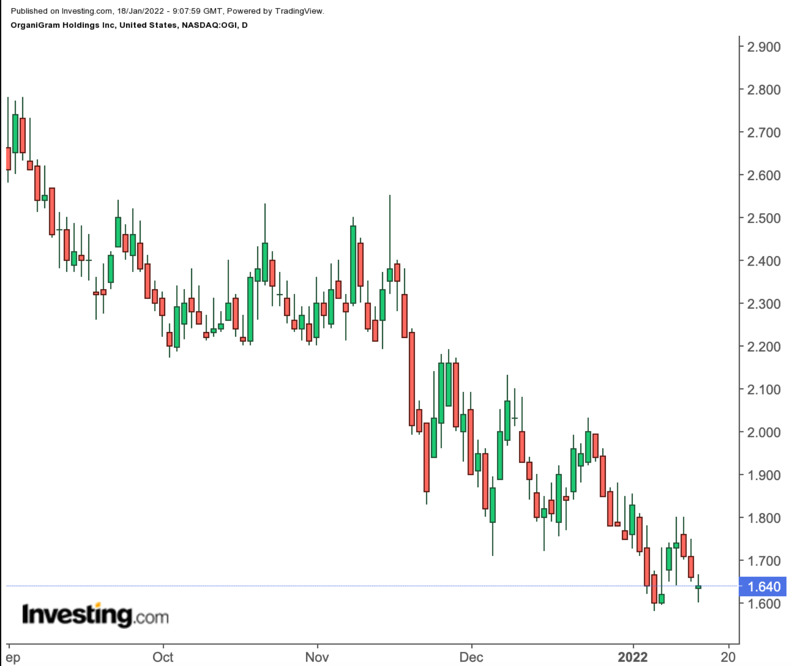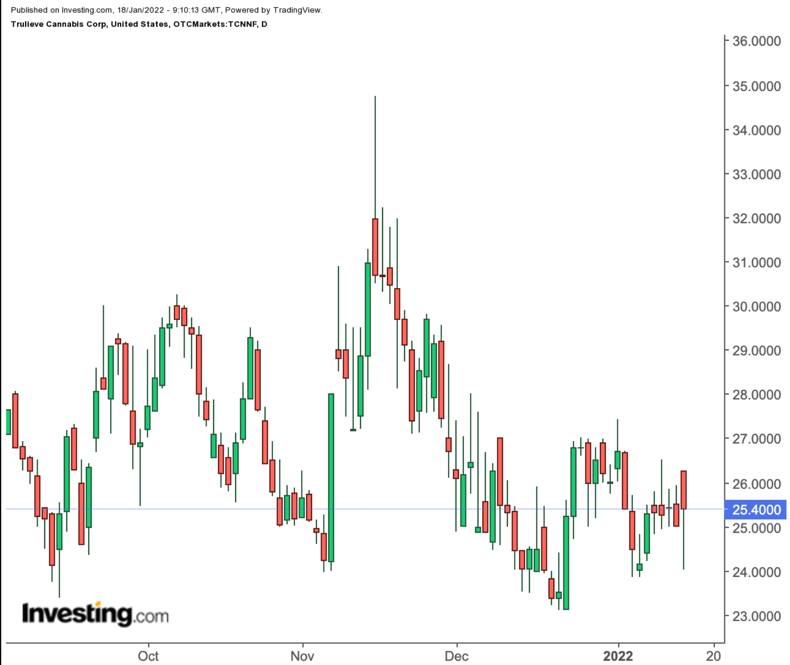
- All Instrument Types
- Indices
- Equities
- ETFs
- Funds
- Commodities
- Currencies
- Crypto
- Bonds
- Certificates
Please try another search

OrganiGram Gains Share Of Cannabis Market, While Major Players Await Washington

With little fanfare and few headlines, a small Canadian-based cannabis company has found itself slowly—and quietly—inching its way closer to becoming the third-largest marijuana company in the country, right behind one of the sector’s most recognizable names—Canopy Growth (NASDAQ:CGC) (TSX:WEED).
That's the situation with OrganiGram Holdings (NASDAQ:OGI) (TSX:OGI), which unveiled its latest quarterly earnings last week, surprising market observers.
The New Brunswick-based company reported better than expected Q1 earnings results on Jan. 11.
The biggest surprise was OrganiGram’s revenues for the period that ended Nov. 30. Net revenues were up 22% for the quarter, or C$30.4 million (US$24.3 million), the highest in the company’s history.
The bump in revenues came with increased sales of recreational cannabis and a 265% jump in the sales of edibles, which reached C$1.9 million (US$1.52 million). Although this category is relatively small, it could play an expanding role in the short to mid-term.
On the other side, OrganiGram was able to rein in its net loss for the quarter, whittling it down to C$1.3 million (US$1.04 million) compared with $34.34 million (US$27.42 million) for the same period in the previous year.
Shares of OrganiGram have slipped slightly since the earnings report, closing Friday on the NASDAQ in New York at US$1.64, and yesterday at C$2.06 in Toronto.
OrganiGram share have lost about 9% in the last year.
At the start of last year, stakeholders in the cannabis sector were optimistic that much-talked-about US federal legislation would be the big game-changer in the industry, throwing open the doors to the world’s largest cannabis market.
Now, at the start of a new year, with that optimism thoroughly beaten back, investors have narrowed their focus and are now looking at how the legislative agenda in Washington is going to impact a specific sector of the industry—multi-state operators. These companies operate in two or more states that have already legalized weed. And they could be the biggest winners if Congress finally passes the Safe Banking Act, the law that would enable cannabis companies to have full access to banking services.
But there is still a big question mark hanging on this move. Last month, the act was removed from an omnibus defence spending bill.
Yet, the probability of greater access to financial services is more likely to become a reality this year. And that could boost the ability of multi-state operators to expand their operations and reach. This would include companies like Trulieve Cannabis (OTC:TCNNF) (CSE:TRUL) and Curaleaf (OTC:CURLF) (CSE:CURA).
Trulieve stock is down slightly so far this year. It closed Friday at US$25.40, up about 1.5%. Its last quarter earnings report highlighted a year-over-year net revenue increase of 64%, hitting US$224.1 million as it posted its 15th consecutive profitable quarter.
Curaleaf stock is in the same position, down slightly so far this year, it closed up a bit last Friday at US$8.23.
In its last quarterly report for the three-month period that ended in September 2021, it posted revenues of US$317 million, a 74% increase over the US$182 million recorded in the same quarter in the previous year.
Both stocks are down around 45% in the last 12 months, putting them in an interesting place for those looking for an inviting entry.
Related Articles

• Trump’s trade war, U.S. jobs report, and last batch of Q4 earnings will be in focus this week. • Costco's earnings report is seen as a potential catalyst for growth, making it a...

The fortune of Nvidia (NASDAQ:NVDA) is closely tied to Big Tech hyperscalers. Although the AI/GPU designer didn’t name its largest clients in the latest 10-K filing on Wednesday,...

The Q4 2024 earnings season tapers off from here, with S&P 500® EPS growth surpassing 17%, the highest in 3 years Large cap outlier earnings dates this week include:...
Are you sure you want to block %USER_NAME%?
By doing so, you and %USER_NAME% will not be able to see any of each other's Investing.com's posts.
%USER_NAME% was successfully added to your Block List
Since you’ve just unblocked this person, you must wait 48 hours before renewing the block.
I feel that this comment is:
Thank You!
Your report has been sent to our moderators for review







Add a Comment
We encourage you to use comments to engage with users, share your perspective and ask questions of authors and each other. However, in order to maintain the high level of discourse we’ve all come to value and expect, please keep the following criteria in mind:
Perpetrators of spam or abuse will be deleted from the site and prohibited from future registration at Investing.com’s discretion.